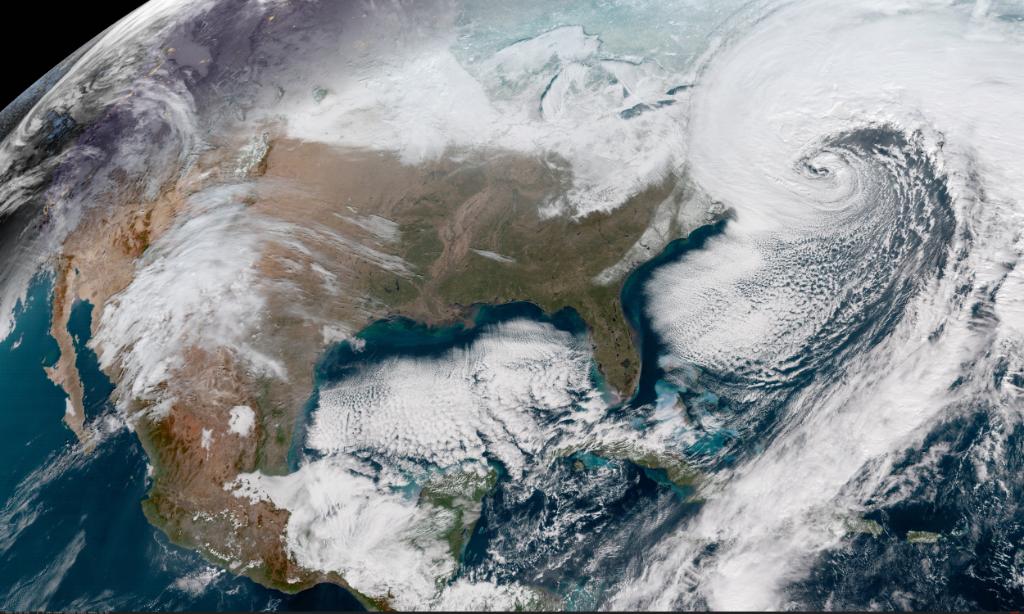This Geocolor image from the National Oceanic and Atmospheric Administration (NOAA) GOES-16 satellite captures the deepening storm off the East coast of the United States on Jan. 4, 2018, at 16:22 UTC. Image credit: NASA
 By Scott DiSavino and Devika Krishna Kumar
By Scott DiSavino and Devika Krishna Kumar
NEW YORK/LONDON, Jan 4 (Reuters) – A severe winter storm froze pipes and disrupted services at refineries on the U.S. Atlantic coast on Thursday, sending fuel prices higher as heavy snowfall and high winds caused electricity outages for almost 80,000 homes and businesses.
Utilities in the Southeast have restored service to some customers who were hit by the storm overnight.
Heavy snow pounded the East Coast from Maine as far south as North Carolina early on Thursday, taking out power lines, icing roadways and closing schools. A bomb cyclone, or bombogenesis, is the result of a rapid decline in barometric pressure by at least 24 millibars in 24 hours.
The region has also been in the grip of a prolonged cold spell.
Prices for heating oil and natural gas in the U.S. Northeast hit their highest levels in years on the back of near-record heating demand. Benchmark U.S. heating oil futures are near their highest in almost three years.
The U.S. average home residential heating oil prices rose 5.4 percent to $3.078 a gallon in the week through Jan. 1 from a week earlier, according to data from the U.S. Energy Information Administration. On the East Coast, prices rose 5.4 percent to $3.085 a gallon.
U.S. average residential heating oil prices for the 2017-18 period are well above the 2016-17 levels, the data showed.
U.S. natural gas demand was expected to remain near record highs this week. Natural gas is the major fuel for residential and commercial heating in the U.S. Northeast and is also widely used by power plants.
On Wednesday, natural gas futures fell 1.6 percent to $3.008 per million British thermal units, but cash prices in New York and New England remain elevated.
“NYMEX Henry Hub prices should rise further to the mid-$3 range, as cash Henry Hub prices already traded above $6. But the market, due to the supposed record-breaking production growth in 2018, still seems to be under-appreciating the potential for cold weather persisting,” Citi analysts said in a note.
New England’s cash prices soared last week, and remained near four-year highs at $36.32 per mmBtu. ISO-New England, that region’s power grid operator, said on Thursday that its power operators were relying more heavily on generators that burn heating oil due to heavy natural gas demand from homes and businesses.
“We expect to have sufficient capacity and fuel available and expect to be able to weather the storm without running up against significant emissions limits, but concerns remain the same regarding fuel availability and emissions limits throughout this protracted cold spell and the rest of the winter,” the company said in a statement.
There are concerns that a significant disruption could lead to a heating oil shortage as distillate inventories, including heating oil, in the New England and Mid-Atlantic regions are at their lowest levels for this time of year since 2015.
This has spurred tankers carrying diesel and heating oil to set out from Europe bound for the United States to address supply worries, reversing a traditional trade route.
Icebreakers have been used in ports of Boston, New York and Philadelphia to keep shipping lanes clear, though delays are expected, and the Coast Guard said late on Wednesday that those ships would remain at shore until the storm had passed.
Reliance on heating oil is highest in the Northeast, with about 21 percent of households using oil for space heating.
Most northern U.S. refiners are not reporting problems. Phillips 66 shut a crude and coking unit at its Wood River, Illinois, refinery after a frozen line and short-lived fire, a source said on Wednesday. It did not have a timeline for restarting the units at the Illinois plant, the source said.
Philadelphia Energy Solutions postponed planned work at its 335,000 refinery complex in Philadelphia until after the storm.
The crude carrier Ridgebury Pioneer, carrying 1.9 million barrels of heavy crude into the Philadelphia area, has been delayed by the storm, according to Reuters Eikon shipping data and two sources familiar with the delivery.
Valero’s 125,000 bpd refinery in Meraux, Louisiana, restarted most operations after instruments froze earlier this week, according to a report by Energy News Today (ENT).
Valero was forced to cut rates at its Port Arthur, Texas, refinery due to the cold weather, ENT reported, and operations are expected to return to normal by the end of the week.
(Reporting by Devika Krishna Kumar, Jarrett Renshaw, Jessica Resnick-Ault and Scott DiSavino; Editing by Toni Reinhold)
(c) Copyright Thomson Reuters 2018.

 Join The Club
Join The Club











